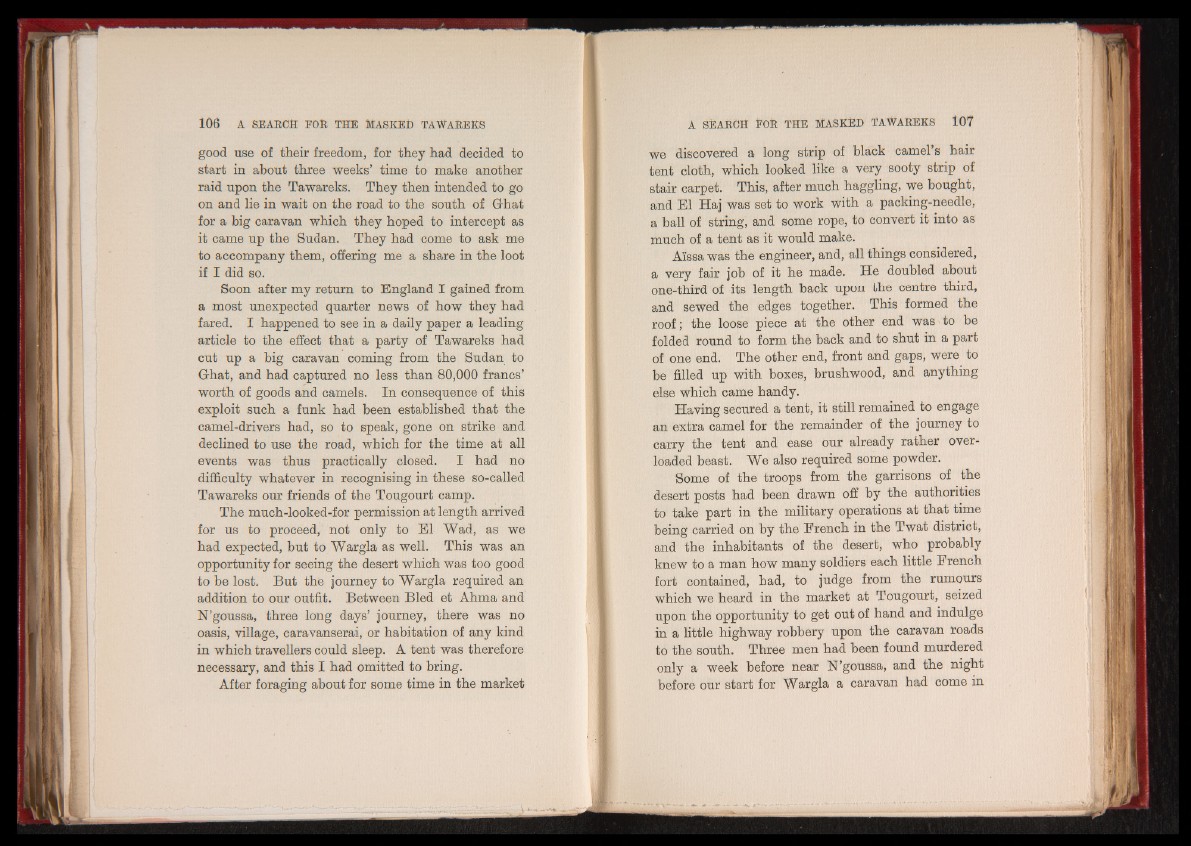
good use of their freedom, for they had decided to
start in about three weeks’ time to make another
raid upon the Tawareks. They then intended to go
on and lie in wait on the road to the south of Ghat
for a big caravan which they hoped to intercept as
it came up the Sudan. They had come to ask me
to accompany them, offering me a share in the loot
if I did so.
Soon after my return to England I gained from
a most unexpected quarter news of how they had
fared. I happened to see in a daily paper a leading
article to the effect that a party of Tawareks had
cut up a big caravan coming from the Sudan to
Ghat, and had captured no less than 80,000 francs’
worth of goods and camels. In consequence of this
exploit such a funk had been established that the
camel-drivers had, so to speak, gone on strike and
declined to use the road, which for the time at all
events was thus practically closed. I had no
difficulty whatever in recognising in these so-called
Tawareks our friends of the Tougourt camp.
The much-looked-for permission at length arrived
for us to proceed, not only to El Wad, as we
had expected, but to Wargla as well. This was an
opportunity for seeing the desert which was too good
to be lost. But the journey to Wargla required an
addition to our outfit. Between Bled et Ahma and
N’goussa, three long days’ journey, there was no
oasis, village, caravanserai, or habitation of any kind
in which travellers could sleep. A tent was therefore
necessary, and this I had omitted to bring.
After foraging about for some time in the market
we discovered a long strip of black camel’s hair
tent cloth, which looked like a very sooty strip of
stair carpet. This, after much haggling, we bought,
and El Haj was set to work with a packing-needle,
a ball of string, and some rope, to convert it into as
much of a tent as it would make.
Aissa was the engineer, and, all things considered,
a very fair job of it he made. He doubled about
one-third of its length back upon the centre third,
and sewed the edges together. This formed the
roof; the loose piece at the other end was to be
folded round to form the back and to shut in a part
of one end. The other end, front and gaps, were to
be filled up with boxes, brushwood, and anything
else which came handy.
Having secured a tent, it still remained to engage
an extra camel for the remainder of the journey to
carry the tent and ease our already rather overloaded
beast. We also required some powder.
Some of the troops from the garrisons of the
desert posts had been drawn off by the authorities
to take part in the military operations at that time
being carried on by the French in the Twat district,
and the inhabitants of the desert, who probably
knew to a man how many soldiers each little French
fort contained, had, to judge from the rumours
which we heard in the market at Tougourt, seized
upon the opportunity to get out of hand and indulge
in a little highway robbery upon the caravan roads
to the south. Three men had been found murdered
only a week before near N’goussa, and the night
before our start for Wargla a caravan had come in